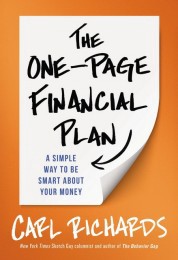A Billfold Book Review: Carl Richards’ ‘The One-page Financial Plan’

Near the beginning of Carl Richards’ new book The One-page Financial Plan, Richards asks his readers a question:
Why is money important to you?
All right, I thought, I’ll answer that. It took me about 15 seconds to come up with three answers:
1. Survival
2. Culture
3. Access
Survival, in this sense, should be self-explanatory; culture means using money to explore interesting things like books and movies; access means using money to get into interesting spaces, like traveling to visit friends or booking tickets on the JoCo Cruise. (Some people would use the word “travel” to describe this, but I’m choosing “access” because I also mean “being able to afford the drink at the fancy bar where the people you want to work with are hanging out.”)
I turned the page. Richards’ examples all picked things like “spending time with family.” One woman said that money was important to her because she’d need it someday for a hypothetical future family.
Pottermore was right, I thought. I am such a Slytherin.
The One-page Financial Plan, which I received as a complimentary review copy, is written for a very specific type of person: the middle to upper-middle class professional who wants to change money habits to achieve family-related goals. Although the fundamental idea behind the book is very strong (and I’ll get to that in a minute) the examples Richards uses are all associated with a certain type of lifestyle: the person who is able to downsize, sell the big house or get rid of the luxury car, cut back on the hours at the medical practice, and use that extra money or time to reconnect with a spouse or give a child educational opportunities.
It’s not quite the right book for the person who is looking to upsize: move into the bigger apartment, invest in more hours at the job, seek out personal educational opportunities. The premise is that you’re already starting from a position of “enough,” maybe even “more than enough,” but you’re not allocating your resources in a way that reflects your personal goals.
That’s the part of the book that’s solid, by the way, and that forms the actual One-page Financial Plan as stated in the title. Here’s how the plan works:
1. Figure out why money is important to you.
2. Figure out how you are actually spending your money.
3. Make the sacrifices necessary to spend/save more of your money in ways that are important to you.
Richards hits the sacrifice point pretty hard, which I appreciate; if you are going to devote more money to retirement savings, for example, you’re going to have to spend less somewhere else. That’s how math works. Another financial book might have presented this as “get a better job, get a side hustle, bring more money into your life!” but this book assumes you’re at the apex of your earnings and are ready to start redistributing resources.
It also assumes that you are able to cut back in certain areas of your spending, which isn’t true for everybody, but maybe that isn’t the point. I support the idea that everyone can, at least to some extent, evaluate whether their spending matches what they truly value. If you’ve been reading the Billfold regularly, for example, you’ve probably noticed that I’ve been writing about how I feel like I’m not contributing enough resources to my friendships. Maybe that means I need to add “friendships” to my list of “values that deserve financial resources.”
If you are interested in reading The One-page Financial Plan, there’s a lot of good advice in this book, even if readers aren’t currently living the lifestyle of its target audience. On the other hand, if you’re in a position where you’re looking to upsize rather than downsize, there might be a better financial book for you.
Support The Billfold
The Billfold continues to exist thanks to support from our readers. Help us continue to do our work by making a monthly pledge on Patreon or a one-time-only contribution through PayPal.
Comments